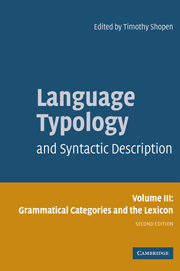Book contents
- Frontmatter
- Contents
- List of figures
- List of tables
- List of contributors
- Acknowledgements
- List of abbreviations and symbols
- 1 Typological distinctions in word-formation
- 2 Lexical typologies
- 3 Inflectional morphology
- 4 Gender and noun classes
- 5 Aspect, tense, mood
- 6 Lexical nominalization
- Bibliography
- Language index
- Subject index
5 - Aspect, tense, mood
Published online by Cambridge University Press: 29 December 2009
- Frontmatter
- Contents
- List of figures
- List of tables
- List of contributors
- Acknowledgements
- List of abbreviations and symbols
- 1 Typological distinctions in word-formation
- 2 Lexical typologies
- 3 Inflectional morphology
- 4 Gender and noun classes
- 5 Aspect, tense, mood
- 6 Lexical nominalization
- Bibliography
- Language index
- Subject index
Summary
Introduction
To introduce aspect, tense, and mood, it might be useful to think first not of language but of a painting, The Hunters in the Snow (1565) by Pieter Bruegel (1525?–69).
This well-known painting depicts a group of three hunters returning home to their village on a winter day, combining a number of detailed states and activities: the grey state of the sky overhead, snow covering the ground, the hunters and their dogs walking on a hill in the foreground, ice-skating on a frozen pond. In an approximate way, these scenes are like predications in language: they represent states and events of the world and of individuals in the world. As in language, events occur in places, under certain conditions, and one can identify some participants as agents (the villagers standing by the boiling cauldron) and some as patients (the pig whom the villagers are singeing in that cauldron). The whole painting is a combination of smaller scenes, just as in language individual predications are combined into larger texts. Up to a point, there is some similarity in what a painting like Bruegel's and language can do in terms of presenting an image of reality. There are, at the same time, significant differences, and these have to do in large measure with aspect and tense and mood.
In Bruegel's painting, the hunters are shown coming over the hill in the foreground and are preparing, we presume, to head down into the valley where their village is located.
- Type
- Chapter
- Information
- Language Typology and Syntactic Description , pp. 280 - 333Publisher: Cambridge University PressPrint publication year: 2007
- 33
- Cited by



